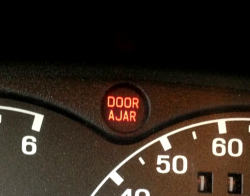
— A Ford "door ajar" sensor lawsuit claims the sensors send false signals that the doors are open when they are in fact closed.
Included in the class-action lawsuit are the:
- 2011-2016 Ford Edge
- 2012-2014 Ford Flex
- 2013-2014 Ford Explorer
- 2011-2013 Lincoln MKX
- 2013 Lincoln MKT
According to the plaintiffs, the door latch assembly uses an electro-mechanical switch (sensor) that detects whether the door is open or closed based on the voltage signal received from the sensor. In addition, a body control module monitors the voltage from the door latch switch to determine whether the door is open or closed.
The lawsuit alleges that when the switch indicates the door is closed, the module sends a "wetting current" through the electrical connector from the door latch switch to the control module that is meant to keep the sensor clean from oxidation. The oxidation typically comes from humidity and moisture, but the wetting current is too low to keep the switch clean.
The lawsuit alleges Ford modified the body control modules in 2011 to reduce the wetting current by 75 percent, something the automaker allegedly admits is not strong enough to keep the sensors clean and working.
The faulty sensor triggers an audible warning, activates a warning light and causes a "Shift to Park" message because the computer mistakenly believes the vehicle has stopped. Owners complain about dome lights that stay on, drained batteries and customers say all the doors unlock and cannot be manually relocked.
According to the plaintiffs, Ford has known about the door ajar sensor problems because the automaker sent technical service bulletins (TSBs) in 2014 that recommended dealers use a special tool to clean the sensors, a procedure known as "burning the wires."
However, the fix was only a temporary work-around that didn't repair the underlying sensor problem, something the plaintiffs say allowed Ford to give the false impression the door ajar problems would be fixed.
Because it was a temporary fix, many customers reported door ajar switch problems after Ford dealers allegedly repaired the sensors. The problem typically came back after the warranty expired, at which point Ford recommended an owner replace the entire door latch assembly at the expense of the owner.
In addition to the expense of trying to fix the sensors, Ford owners say the audio and visual warnings are distracting, causing some drivers to pull off the roads just to check the doors. The illuminated dome lights also cause drivers vision problems at night, and owners complain about the cost of replacing drained batteries.
The lawsuit alleges Ford customers have filed more than 2,600 complaints about the door ajar problems, while Ford has received more than 33,000 warranty claims.
Because of the high number of complaints, the National Highway Traffic Safety Administration (NHTSA) opened an investigation into door ajar warning lights in Ford Edge SUVs. But the 2016 investigation was closed in March 2017 when NHTSA said an "unreasonable risk to motor vehicle safety has not been identified."
Ford told the judge there is no unreasonable safety risk because NHTSA concluded its investigation by saying a recall wasn't necessary. However, the judge disagreed because NHTSA also said the "closing of this investigation does not constitute a finding by NHTSA that a safety-related defect does not exist."
The judge granted in part and denied in part Ford's motion to dismiss the door ajar lawsuit.
Concerning consumer protection claims made by three plaintiffs, the judge dismissed the claims but with leave to amend to "plausibly plead reliance under the laws of their states."
A fourth plaintiff saw his claims dismissed without leave to amend because they are time-barred, but the judge allowed claims from the remaining plaintiffs because "they adequately plead that the safety risk could manifest without adequate warning."
The judge also dismissed all express warranty claims without leave to amend and dismissed most implied warranty claims, but will allow the plaintiffs to amend most of the implied warranty claims.
However, the judge refused to dismiss claims made by certain plaintiffs because "unmerchantability has been adequately pled through establishment of an unreasonable safety hazard."
The Ford door ajar sensor lawsuit was filed in the U.S. District Court for the Northern District of California - David Baranco, et al., v. Ford Motor Company et al.
The plaintiffs are represented by Barnow and Associates, P.C., Blood Hurst & O’Reardon LLC, the Davenport Law Firm LLC, and McCuneWright LLP.




